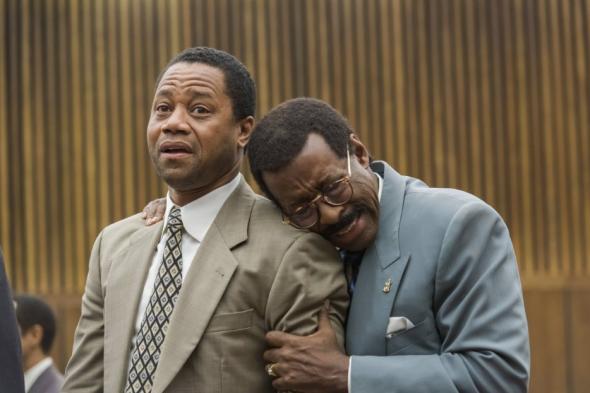FX’s American Crime Story: The People v. O.J. Simpson ended exactly as we all knew it would, with Simpson’s acquittal on all charges. But a story well-told reveals something new in its every hearing. The People v. O.J. Simpson was not just a delicious, exciting, trashy-in-all-the-right-ways bit of entertainment; it was a revisionist pop history, hellbent on making an argument with some new permutations about a subject we think we know all about.
The show was based on Jeffrey Toobin’s The Run of His Life: The People vs. O.J. Simpson, a book that states at the outset that it is not interested in O.J.’s guilt or innocence—he’s guilty, as far as Toobin is concerned—but in how the case became a racial flashpoint. The book, though, was written soon after the trial, when the not-guilty verdict was freshly surprising to both white Americans, who largely believed in Simpson’s guilt and expected the system to reflect this view, and black Americans, who largely believed in Simpson’s innocence and expected the system to reject this view. In the 20 years since it happened, the case has become a racial Rorschach test, a symbol of the gulf between black and white Americans and the different ways that we experience life in this country we share, that usually boils down to the verdict: Did he do it?
But over the course of its 10 episodes, The People v. O.J. Simpson set out to lessen verdict fixation. It tried to bridge the chasm between guilty and not guilty. The finale was a little ham-handed because it was a rapprochement, a not completely successful attempt to come to a conclusion sympathetic to all sides: In the O.J. case, we all wanted justice. The show presented the verdict as both a miscarriage of justice and a correction to justice. A guilty man went free and a selectively color-blind system was taught to see—for a little while, anyway, in both cases.
The People v. O.J. Simpson took Simpson’s guilt as a given, showing him to be the beneficiary of a fellow-feeling he didn’t deserve. (Think of the moment in the finale, just after the verdict has been read, when one of the jurors gives O.J. a black power salute and he is momentarily flummoxed, not knowing what to do with it.) The series presented the copious amounts of physical evidence against him as fact and all the defense team’s strategies to undermine that evidence as exactly that: strategies, if highly effective ones.
In the last few minutes of the episode, in which a freed O.J. returns to Brentwood, we see man who doesn’t yet understand his drastically changed circumstance but who is kind of a creep anyway, having the tone-deafness to deliver a speech about Nicole and Ron at a party full of strangers. Plus, the show’s stand in for the O.J. believer, Rob Kardashian (played with an ever-elongating puppy dog face by a clueless David Schwimmer), even comes to suspect the Juice, there being no other suspects.
The show strengthened the prosecution’s case by rescuing Marcia Clark’s (Sarah Paulson) reputation from the slambook of history. (She was presented unflatteringly by Toobin, as she was by nearly everyone at the time.) With respect to Clark’s rep, the show played the historian more than TV series usually do, if by utilizing the tools of fiction. The People v. O.J. Simpson portrayed Clark as a diligent, well-meaning prosecutor scoured by rampant sexism for her insufficiently feminine clothes and manner—while also casting a great actress to play her, treating her with enormous sympathy, and tossing in a ’ship-worthy romance with fellow prosecutor Christopher Darden (Sterling K. Brown).
In the finale, the show matched—or tried to match—its belief in O.J.’s guilt with the suggestion that his being found not guilty served a kind of social function. In the show’s version of the closing statements, Clark and Darden speak convincingly and movingly about Simpson’s guilt and his abuse of Nicole Brown Simpson. In comparison, Johnnie Cochran’s (Courtney B. Vance) closing is all over the place: a corny catchphrase—“if the glove doesn’t fit, you must acquit”—haphazardly joined to a serious call to “send a message that resounds outside these walls” about the racism of the Los Angeles Police Department that is only loosely connected to Simpson. But the black members of the jury heed Cochran’s words and the case he has made all trial, against the police. In deliberations, enough of them say they will “never” believe Simpson is guilty beyond a reasonable doubt, and the two white jurors just don’t have that kind of conviction.
After the trial—and real footage showing black and white Americans reacting in completely different ways to the verdict—Darden goes to Cochran to dress down his accomplishment. “This wasn’t a civil rights landmark. You haven’t changed anything for black people, unless you’re a famous rich one in Brentwood,” he tells Cochran. Two decades later, from a certain vantage, we know that Darden is right: Police racism, brutality, and mistreatment didn’t end or slow or change much because of the verdict. But the show follows Darden’s comments with Cochran’s counter: We see him watching President Bill Clinton talking about the case and the different ways that black and white Americans think about it, and he says, “That’s the victory. We see the world in different ways. Our story is now out of the shadows.” Like so much about The People v. O.J. Simpson, this is completely unsubtle and—in the moment—a little cheesy. But it reframes the stakes of the trial, in extremely contemporary terms: to demonstrate to white people that subterranean racism is real.
